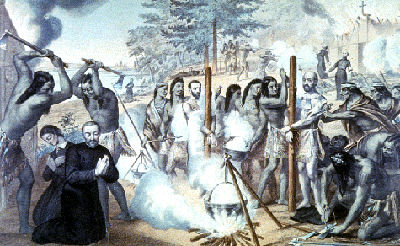The Jesuit Mission
Spurred by the inspirational writings of their founder and unswerving in their obedience to the papacy, the Jesuits quickly became known as the schoolmasters of Europe - teaching not only the tenets of the Catholic faith but also subjects as varied as the Latin classics and dancing.
The Jesuits' mission was to teach people "the way into heaven" and they declared themselves "ready to die for the honour of ...our good Lord and for the salvation of these poor people." In the New World, their goal was to bring lost souls to Christianity and they were willing to endure hardships and to shed their blood to succeed.
The First Jesuits Arrive in New France
The Jesuits first came to New France as missionaries in 1611. Pierre Biard and Enemond Massé arrived at Port-Royal on 22 May 1611. Massé was driven out of Acadia by the English but was among the first group of Jesuits who arrived at Québec in June 1625. With him were Charles Lalemant, Jean de Brébeuf and two lay brothers.
Brébeuf spent many years among the Huron, learning their language and culture and building a number of missions that initially met with little success in converting the First Nations to Christianity. Brébeuf was convinced that he had been chosen by God and had a vision that he would die a violent death in His name. On 16 March 1649 the Iroquois, who were in the process of destroying the Huron nation, captured Brébeuf and Gabriel Lalemant. The two Jesuits were carried off to Saint-Ignace, where they suffered one of the most atrocious martyrdoms in the annals of Christianity.
The Jesuit Accomplishment
The Jesuits were linguists, explorers and ethnographers. They learned Indigenous languages and customs, developed dictionaries and grammars, translated and preserved much of the history and traditions in their documents. The most famous of these documents are the Jesuit relations, which include details of their missions and activities and both the successes and failures of the Jesuits in their attempts to convert Indigenous peoples (see Ste Marie Among the Hurons).
On 21 July 1773 the papal brief Dominus ac Redemptor suppressed the Society of Jesus throughout the world. Bishop of Québec Jean-Olivier Briand in 1774 refused to put the order into effect, however. The Jesuits kept their name and religious habit in Québec, and retained possession of their property. Since Britain refused to allow the Jesuits and Récollets to recruit new members and would not allow French priests to come to Canada, the numbers reduced as members of the order died. The last Canadian Jesuit, Father Jean-Joseph Casot, died at Québec in 1800. Pope Pius VII reconstituted the order in 1814, and by 1842 Jesuits had reappeared in Québec.
A significant part of the Jesuits' earliest evangelical work involved education and the founding of parishes, schools and post-secondary institutions throughout Canada. The Jesuit seminary in Québec (Séminaire de Québec) was established in 1663. The institution comprised the Grand Séminaire that educated men for the priesthood and the evangelical ministries, and the Petit Séminaire (1668) that was originally established for the education of students in New France who planned to attend the seminary. The Collége des Jésuites evolved into Université Laval. In 1848, Loyola College at Collège Ste-Marie in Montréal was founded as an English-language program of the Jesuit Society and in 1896 Loyola College became a distinct institution.
Today, the Jesuit Society is the largest men's religious order in the Roman Catholic Church. In 2011 there were approximately 20 000 Jesuits worldwide with about 500 Canadian members divided equally between English and French in two juridical regions. Canadian Jesuits support the evangelical work of missions around the world.
In 2009, the Jesuit Archive in Canada opened in Montréal. The archive documents the history of the Jesuits in Canada since 1611. The motto of the Jesuits is Ad Majorem Dei Gloriam, "for the greater glory of God."

 Share on Facebook
Share on Facebook Share on X
Share on X Share by Email
Share by Email Share on Google Classroom
Share on Google Classroom



